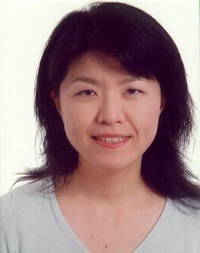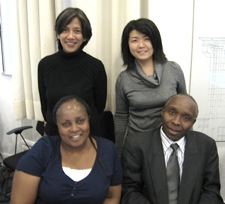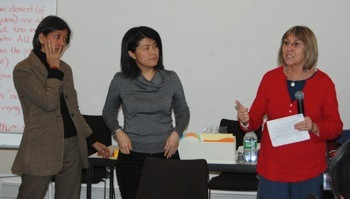 Rika Yorozu, Japan
Rika Yorozu, Japan
Programme Specialist
UNESCO Institute for Lifelong Learning (UIL), Hamburg, Germany
International Development Studies (’03)
What is your area of specialization and how did you come to work in this area?
I’m a specialist on lifelong learning, in particular basic education for adults. At the global level, there are over 796 million adults who are illiterate. Their rights to education were not fulfilled due to poverty, conflict, low quality of schools or for many other reasons. There is even a higher number of adults who need basic education. In Germany alone, there’s a new study that found out that there are 7.5 million functional illiterates which makes up 14% of the population. Functional illiterates have limited writing and reading skills to function in a society and the levels are defined differently across countries.
The first job I had after graduating from college was an NGO in Japan called Asia-Pacific Cultural Centre for UNESCO. There, I worked on a regional collaboration programme to promote literacy in the Asia-Pacific. Focus was on developing curriculum and supplementary teaching-learning materials and building capacities of literacy specialists in the region. I’ve continued to work in this field and now I’m dealing more with policy research, advocacy and capacity building of education policy makers.

You are currently working as Programme Specialist at the UNESCO Institute for Lifelong Learning (UIL) in Hamburg. What are your main responsibilities and duties?
I’m responsible for coordinating UIL’s work covering the Africa region which is a priority region of UNESCO and a gender focal point. I’m also a desk officer for literacy programmes in China, Eritrea, Gambia, India and Nepal.
What are some of the biggest challenges you face in your work?
The biggest challenge is to sustain the commitments of governments and development agencies in order to put into action various declarations and recommendations agreed at international level. The main international agreement my institute is promoting is the CONFINTEA VI Belém Framework for Action: Harnessing the power and potential of adult learning and education for a viable future. Adult education is not a ‘sexy’ field in the development. I see it as fundamental to development but it only gets a small share of attention and funding in the education and development sectors. We, UIL is good at sustaining global discourse on our issues but we need to find a better way to advocate our issues to a wider audience like parliamentarians and the media.
What led you to GRIPS? What was the most important thing you learned while here? And how has your experience at GRIPS prepared you for future endeavors?
In order to advance in my career, I was looking for a part-time master’s programme. The GRIPS-FASID International Development Studies had courses that were interesting and was designed for Japanese working in the development field so I applied. What I did not realize was that it is a full-time intensive programme for one-year. I am grateful that my office allowed me to take leave to complete the study.
The analytical skills, especially quantitative analysis I learned in GRIPS have been useful in my current work. It was good to know the logics of economists or the Ministry of Finance for me to play a role of ‘honest broker’ between funding/lending agencies and education providers.
You have spent quite some time outside your home country, Japan. Can you describe your experience of living and working abroad? Where do you call ‘home’ these days?
I’ve spent about half of my life outside of Japan so I’ve gotten used to living and working abroad. Japan is still my home and I am very concerned with the triple disaster – the earthquake, tsunami and nuclear crisis – that recently struck Japan which I can only follow with the news and information I get from the net.

What do you miss about Japan and what do you like about living in Germany?
I miss the variety of taste in food, especially Japanese dishes. Restaurants around my office serve one-dish food for lunch. I prefer to eat small portions of salad, pasta and desert rather than one big portion of pasta. What I like about Hamburg is that it’s a cosmopolitan city with lots of trees, parks and canals. There are not many tourists so it’s also a safe place to live.
If you could choose another profession to be in, what would it be?
Maybe a teacher or manager of a spa resort.
What is your fondest memory of your time spent at GRIPS?
Chatting with classmates in the study room.
What is your favorite thing to do when you are not working?
Sundays, shops are closed in Germany so I cannot go window-shopping which is my favorite thing to do in Japan. Week-ends are my time with my two kids – walking around the park, visiting fairs or exhibitions. For holidays, I like going to beach resorts just to relax and to be pampered. I suppose I like sleeping more than reading because I always fall asleep before I could do any reading for pleasure.
How do you maintain a balance between your work and the rest of your life?
I’m not putting 100% of energy into work like I used to when I was single. Working in Germany is a plus; my German colleagues will tell me that I should go home if I work until late in the office or my kids get sick. And I live in a convenient place close to my office, super-market and kindergarten so that I have fewer things to hassle. When I can spend more energy into work, perhaps in five years or so, I hope to have more responsibilities at work.
What advice would you give to current GRIPS students?
Make use of the time in GRIPS to discuss with class-mates the current news and read lots of research papers that interest you.
Do you have any suggestions on how to further strengthen and utilize the GRIPS alumni network?
No. Using social media like Facebook and Yahoo groups are keeping the alumni together. If I can, I would like to come back to GRIPS to do research on policy development for lifelong learning in Japan. The more I analyze the education policy development in developed and developing countries, I am tempted to share the experiences of Japan. Problem is that most information is only available in Japanese so the knowledge is not easily shared with other countries. And I don’t have time during work to translate them into English. South Korea is doing good work making available their knowledge on education and training in English.





